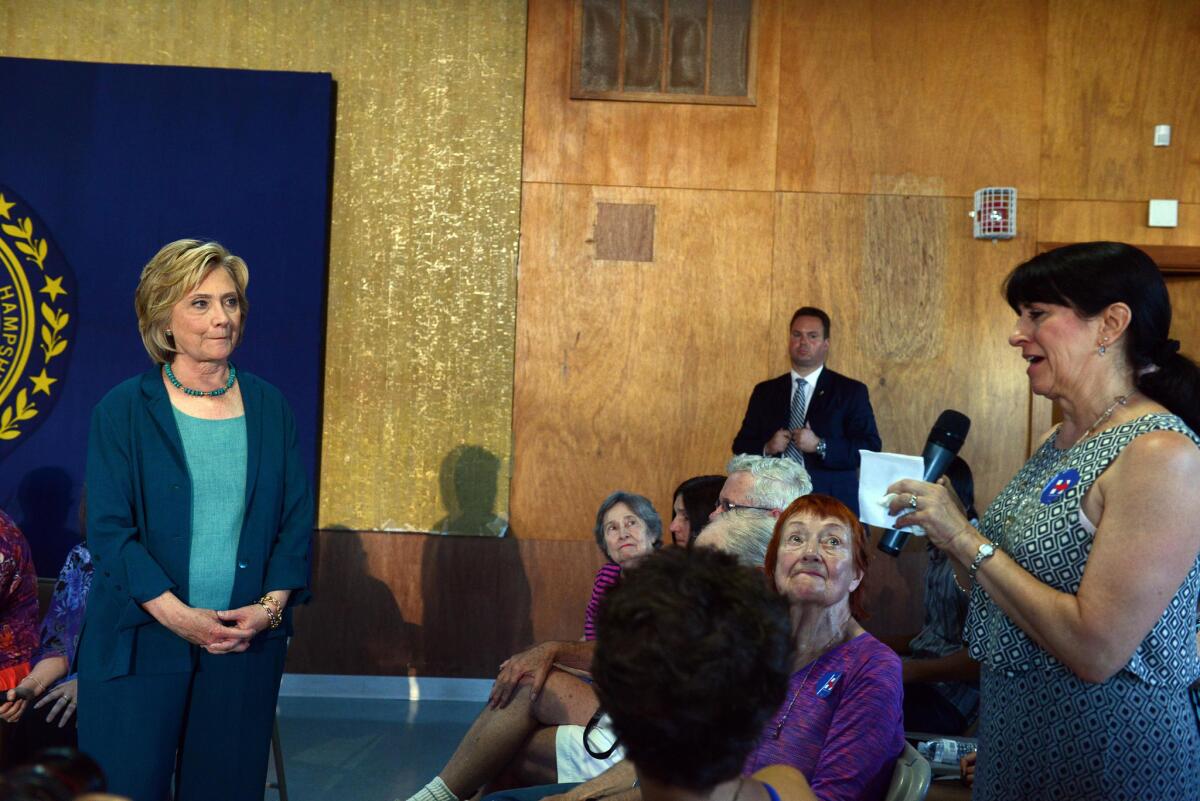New Hampshire heroin crisis leads presidential candidates to tackle drug abuse

Democratic presidential candidate Hillary Clinton listens at a forum in Laconia, N.H., on Sept. 17 as Cindie Graham talks about losing a loved one to drugs.
Reporting from MANCHESTER, N.H. — Zach Brewster had a long history of addiction and was dealing drugs after flunking out of college.
One night he injected a cocktail of cocaine and heroin and stopped breathing. He was taken by ambulance to the emergency room of the suburban hospital that employed his parents, where they were told their son might not survive the night.
When he pulled through, his parents thought the scare might make him serious about recovery.
Three days later, he was back to using heroin.
Over the last decade, families like the Brewsters have become the face of opioid and heroin addiction that is gripping the Northeast. Until recently, the epidemic received little attention.
But a sharp increase in heroin overdoses over the last 18 months and New Hampshire’s first-in-the-nation presidential primary are placing the issue squarely in front of the country as candidates barnstorm the state.
At town halls, in diners and at house parties, candidates of both parties are hearing tales from anguished voters about drug addiction in their families. And the White House hopefuls are repeatedly grilled about their approach to fighting drug abuse.
“If they didn’t get it before they started campaigning, they certainly get it now,” said Tim Soucy, director of Manchester’s Public Health Department. “We’ve always had heroin and opioid addiction issues, but it has really exploded. It’s so cheap and so readily available.”
The presidential candidates today have placed a far greater emphasis on rehabilitation than punishment. This is a departure from nearly a half-century’s approach, starting with President Nixon’s “war on drugs” and through the 1990s, when the number of people imprisoned for nonviolent drug offenses skyrocketed.
State governments began turning to rehabilitation during the first decade of the new millennium, but the federal government only recently began shifting its focus.
Brewster has seen both approaches. He has been arrested nearly a dozen times and has spent time in treatment centers that cost tens of thousands of dollars a month. None of it worked, until one day in 2013 when he woke up in a hotel room surrounded by people doing drugs and he felt as though a “concussion grenade” went off in his head. He acted on an overwhelming urge to call his mother and told her he was serious about getting straight.
“We were just assuming every phone call we got after a hiatus of not hearing from Zach would be the last,” said his father, Bill Brewster, a physician at Harvard Pilgrim Health Care, where he works as associate medical director for New Hampshire. Zach’s mother, Jo-Ann, is an emergency room nurse at the hospital.
The state attorney general told a legislative task force this month that New Hampshire was on pace this year to see a record of more than 400 overdose deaths related to heroin and opioids — double the number two years ago.
NEWSLETTER: Get the day’s top headlines from Times Editor Davan Maharaj >>
A major cause is people being prescribed painkillers, developing an addiction and then switching to heroin because a crackdown made it more difficult to obtain prescription opioids and because of the cheap and abundant supply of the illegal narcotic. A 30-milligram oxycodone pain pill can cost $90 to $100 on the street, money that can buy 10 or more doses of heroin, Soucy said.
Heroin addiction is a nationwide problem. The rate of heroin use doubled from 2002 to 2013, and the number of overdose deaths nearly quadrupled, according to the Centers for Disease Control and Prevention.
Geographically, the problem is the greatest in the Midwest and the Northeast, and New Hampshire is one of the epicenters.
Manchester is the state’s largest city, with about 110,000 residents. This year, paramedics have responded to nearly 700 overdose calls, with 85 deaths. Mayor Ted Gatsas raises the crisis with every candidate he meets.
“It’s the first thing we have a conversation about,” Gatsas said. “If there was any one item that was killing people at the rate that this is doing, people would be outraged.”
He added, “If this has not touched you yet, it will very soon.”
Indeed, many of the Republican presidential candidates have personal connections with addiction.
Former Florida Gov. Jeb Bush has spoken about his daughter, Noelle, who battled prescription drug abuse and was jailed for possessing crack cocaine. Sen. Ted Cruz’s sister and former Hewlett-Packard chief Carly Fiorina’s daughter both overdosed and died.
The candidates’ candor reflects a growing movement to increase awareness by being open about the cause of such deaths. It’s seen in the too frequent obituaries of young people in the New Hampshire Union Leader; write-ups now include information provided by families about their loved ones’ struggles with addiction and death by overdose, rather than euphemisms about “dying suddenly.”
At a town hall in Belmont, N.H., this year, New Jersey Gov. Chris Christie described staging an intervention for a close, successful friend from law school who developed an addiction to pain pills after a back injury. The man was in and out of rehab for a decade before being found dead in a motel room with an empty bottle of Percocet and an empty quart of vodka.
“When I sat there as the governor of New Jersey at his funeral and looked across the pew at his three daughters sobbing because their dad is gone, there but for the grace of God go I. It can happen to anyone,” Christie said. “And so we need to start treating people in this country, not jailing them. We need to give them the tools they need to recover because every life is precious.”
Democratic presidential candidate Hillary Clinton hosted a drug forum in Keene, N.H., where she laid out a $10-billion proposal that would send states federal money to boost treatment programs and urge law enforcement to focus on rehabilitation rather than incarceration.
Susan McKeown, a nurse practitioner, was among the local drug experts Clinton consulted. After dealing with addiction in their family, McKeown and her husband, Patrick, started a support group 13 years ago for parents of addicts in Manchester. Back then, the gatherings attracted parents of teens who were drinking alcohol or smoking marijuana, missing curfew and cutting school.
At a meeting this month, when asked whether their child was battling heroin or opioid addiction, all but two of the 15 attendees raised their hands.
The McKeowns were asked to expand the groups around the state. There are now 12, with three more scheduled to start in January.
Many obstacles remain: There is a bed shortage in residential programs, resulting in waiting lists that are weeks long. An effort to create a drug court in Manchester failed because of a lack of funding. And drug dealers are increasingly cutting heroin with a synthetic version of the analgesic fentanyl, which is much more powerful and is leading to more overdoses.
Zach Brewster, who has stayed away from drugs for more than a year, now runs the learning center at Teen Challenge, the 26-bed men’s group home where he lived for 15 months in downtown Manchester during his rehabilitation. (Despite its name, the group home treats adult addicts.)
Brewster, now 29, said he believes he has a “moral obligation” to share his experiences with others.
“Help is going to come from success stories, people who aren’t afraid to talk about what they’ve come from.”
Twitter: @LATSeema
ALSO
In at least one huge deal in L.A., Trump got schooled
A more prickly Democratic debate erupts in early-voting New Hampshire
Why the voter file data breach by Bernie Sanders’ campaign is a big deal for Democrats
More to Read
Sign up for Essential California
The most important California stories and recommendations in your inbox every morning.
You may occasionally receive promotional content from the Los Angeles Times.










